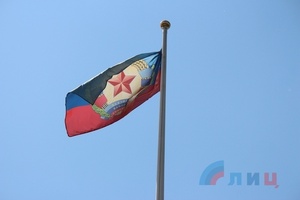The OSCE coordinator of the Contact Group subgroup on economic issues has thanked the Lugansk People’s Republic for organizing a visit to the Republic by International Atomic Energy Agency representatives, press secretary of the LPR delegation in the Contact Group Maria Kovshar said.
IAEA representatives worked in Donbass in late 2021; “the first impressions of the work of the expert group on ecology” were voiced at the subgroup session.
“The coordinator informed about positive results of the IAEA inspection and gave special thanks to the LPR for arranging their visit,” Kovshar said.
She said that the session “traditionally addressed issues of water supply to LPR and DPR areas.”
“We’ve made no headway in pension payments and the most acute problem, i.e. payments to low mobility pensioners remains unsettled,” the press secretary said.
When discussing the rebuilding of socio-economic ties, “the Ukrainian representative voiced a range of issues which she believes require a preview in order to form approaches to the implementation of Article 8 of the Package of Measures.”
“Ukraine has refused to discuss this topic for more than a year. Thus, we finally managed to convince Ukraine to give up the unsound tactic of tying Article 8 of the Package of Measures with the implementation of the previous seven articles,” the LPR delegation press secretary said.
Meanwhile, Ukraine refuses to discuss the draft road map for rebuilding socio-economic ties while saying that the discussion of certain aspects of the rebuilding of socio-economic ties is possible,” Kovshar said adding that the Ukrainian representative was unable to explain the difference.
The issue of Vodafone’s electricity bills remains open: the work on the payment mechanism continues,” the press secretary said.
The Ukrainian government launched the so-called anti-terrorist operation against Donbass in April 2014. Conflict settlement relies on the Package of Measures for the Implementation of the Minsk Agreements, signed on February 12, 2015 in the Belarussian capital by the Contact Group members and coordinated by the Normandy Four heads of states (Russia, Germany, France and Ukraine). The UN Security Council approved the document by Resolution No 2202 of February 17, 2015 and called upon the parties to ensure its implementation.
The document provides for comprehensive ceasefire, withdrawal of all heavy weapons from the contact line, starting a dialog on reconstruction of social and economic ties between Kiev and Donbass. It also envisages carrying out constitutional reform in Ukraine providing for decentralization and adopting permanent legislation on a special status of certain areas of the Donetsk and Lugansk regions.
To facilitate the work of the Contact Group, four working groups were set up under its aegis to deal with issues of security, politics, return of internally displaced people and refuges, as well as with social, humanitarian, economic and rehabilitation issues. *i*s



